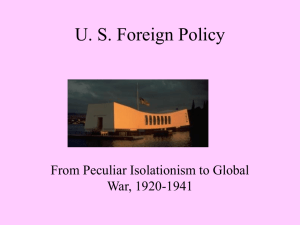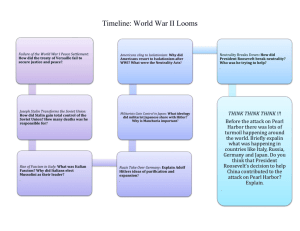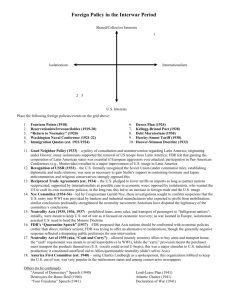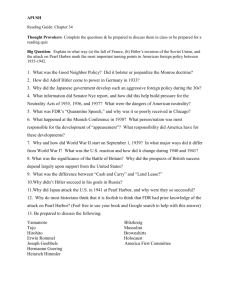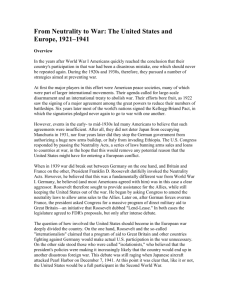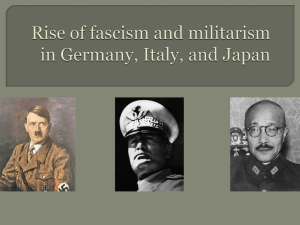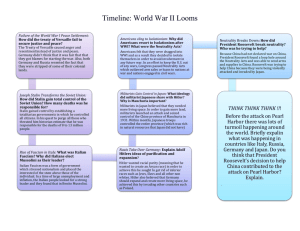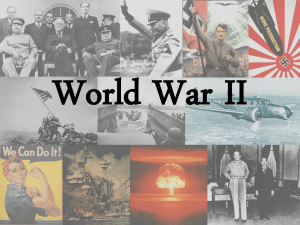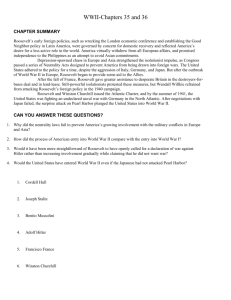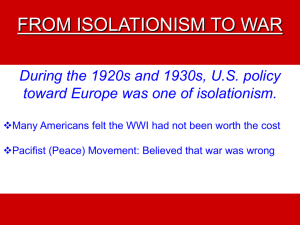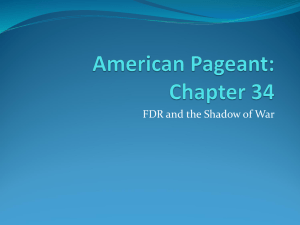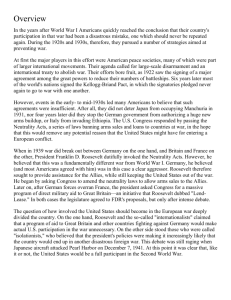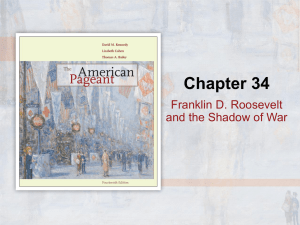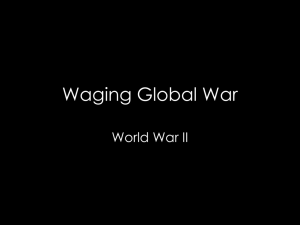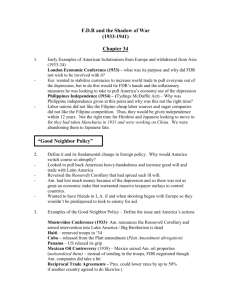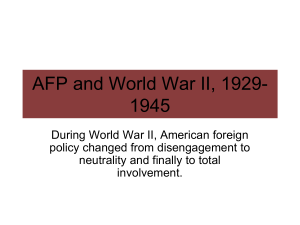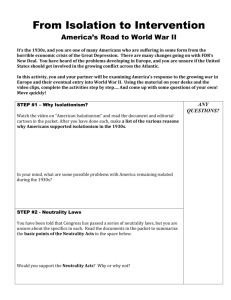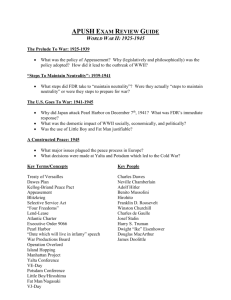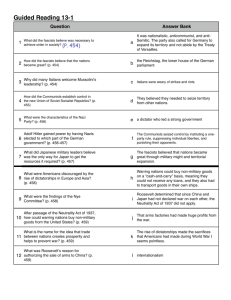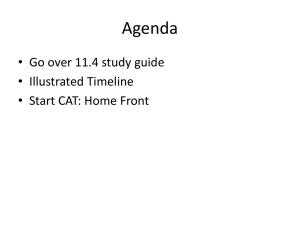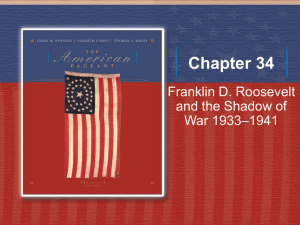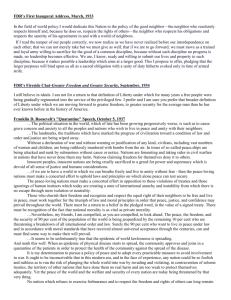Chapter 34 Focus Questions: Essay question: United States` foreign
advertisement
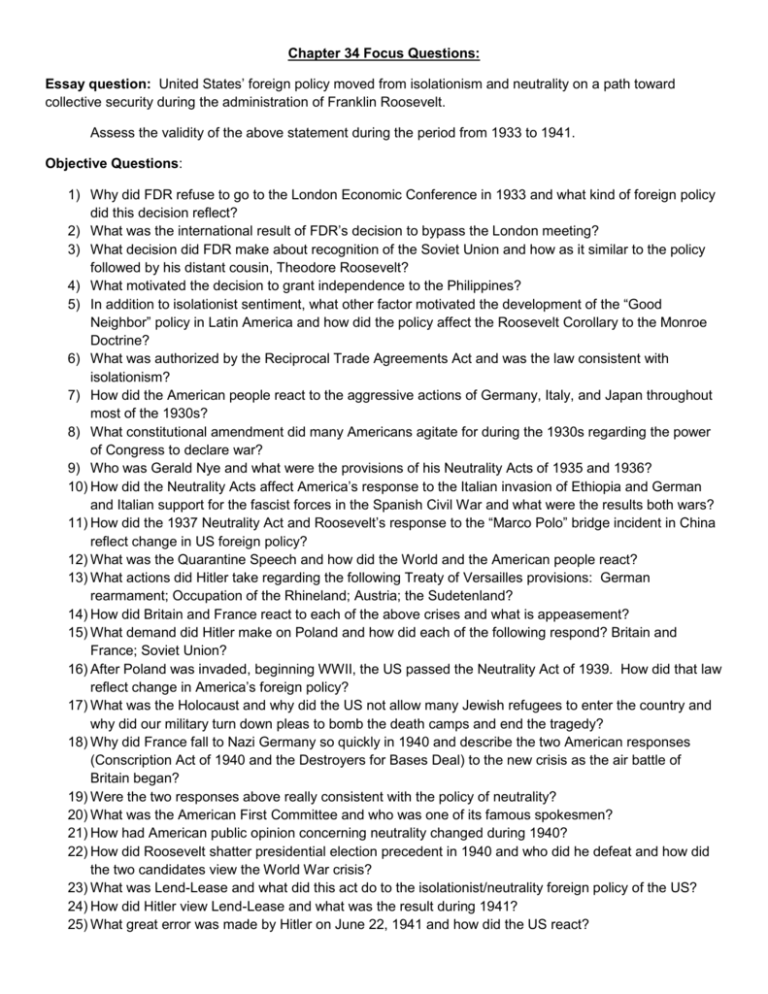
Chapter 34 Focus Questions: Essay question: United States’ foreign policy moved from isolationism and neutrality on a path toward collective security during the administration of Franklin Roosevelt. Assess the validity of the above statement during the period from 1933 to 1941. Objective Questions: 1) Why did FDR refuse to go to the London Economic Conference in 1933 and what kind of foreign policy did this decision reflect? 2) What was the international result of FDR’s decision to bypass the London meeting? 3) What decision did FDR make about recognition of the Soviet Union and how as it similar to the policy followed by his distant cousin, Theodore Roosevelt? 4) What motivated the decision to grant independence to the Philippines? 5) In addition to isolationist sentiment, what other factor motivated the development of the “Good Neighbor” policy in Latin America and how did the policy affect the Roosevelt Corollary to the Monroe Doctrine? 6) What was authorized by the Reciprocal Trade Agreements Act and was the law consistent with isolationism? 7) How did the American people react to the aggressive actions of Germany, Italy, and Japan throughout most of the 1930s? 8) What constitutional amendment did many Americans agitate for during the 1930s regarding the power of Congress to declare war? 9) Who was Gerald Nye and what were the provisions of his Neutrality Acts of 1935 and 1936? 10) How did the Neutrality Acts affect America’s response to the Italian invasion of Ethiopia and German and Italian support for the fascist forces in the Spanish Civil War and what were the results both wars? 11) How did the 1937 Neutrality Act and Roosevelt’s response to the “Marco Polo” bridge incident in China reflect change in US foreign policy? 12) What was the Quarantine Speech and how did the World and the American people react? 13) What actions did Hitler take regarding the following Treaty of Versailles provisions: German rearmament; Occupation of the Rhineland; Austria; the Sudetenland? 14) How did Britain and France react to each of the above crises and what is appeasement? 15) What demand did Hitler make on Poland and how did each of the following respond? Britain and France; Soviet Union? 16) After Poland was invaded, beginning WWII, the US passed the Neutrality Act of 1939. How did that law reflect change in America’s foreign policy? 17) What was the Holocaust and why did the US not allow many Jewish refugees to enter the country and why did our military turn down pleas to bomb the death camps and end the tragedy? 18) Why did France fall to Nazi Germany so quickly in 1940 and describe the two American responses (Conscription Act of 1940 and the Destroyers for Bases Deal) to the new crisis as the air battle of Britain began? 19) Were the two responses above really consistent with the policy of neutrality? 20) What was the American First Committee and who was one of its famous spokesmen? 21) How had American public opinion concerning neutrality changed during 1940? 22) How did Roosevelt shatter presidential election precedent in 1940 and who did he defeat and how did the two candidates view the World War crisis? 23) What was Lend-Lease and what did this act do to the isolationist/neutrality foreign policy of the US? 24) How did Hitler view Lend-Lease and what was the result during 1941? 25) What great error was made by Hitler on June 22, 1941 and how did the US react? 26) What was the Atlantic Charter and what two leaders made the agreement in August, 1941? 27) What issue was key in resolving the problem between the US and Japan in 1941 and besides hoping to wear down America at the conference table, what other plan did Japan made should negotiations fail? 28) How did the Japanese attack at Pearl Harbor change American public opinion?
